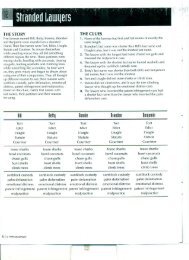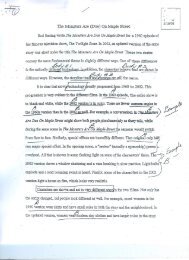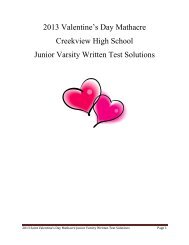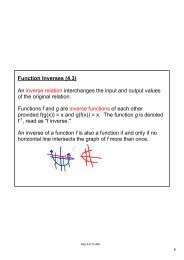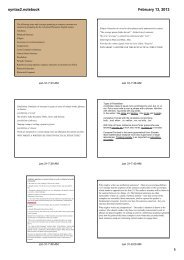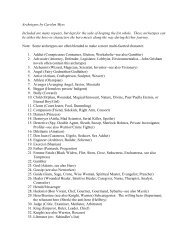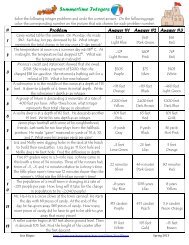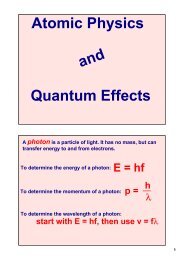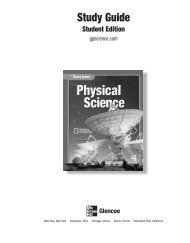Rosencrantz and Guildenstern Are Dead - Cherokee County Schools
Rosencrantz and Guildenstern Are Dead - Cherokee County Schools
Rosencrantz and Guildenstern Are Dead - Cherokee County Schools
You also want an ePaper? Increase the reach of your titles
YUMPU automatically turns print PDFs into web optimized ePapers that Google loves.
emember ever having seen those letters in that order before...?" All of us have probably had this quirky<br />
experience of uncertainty <strong>and</strong> Stoppard's evocation of it helps the audience identify with his beleaguered<br />
heroes. <strong>Rosencrantz</strong> says, nostalgically, "I remember when there were no questions" <strong>and</strong> <strong>Guildenstern</strong><br />
responds with, "There were always questions. To exchange one set for another is no great matter." And<br />
<strong>Rosencrantz</strong> perhaps responds for a twentieth-century audience when he concludes, "Answers, yes. There<br />
were answers to everything." The concept of God was once the answer to everything, but with that concept in<br />
question in the modern world, nothing, not even science or technology, has come to take its place.<br />
<strong>Guildenstern</strong> responds to his friend's nostalgic memories of certitude by pointing out that all of the answers<br />
now are "plausible, without being instinctive." In other words, in the modern world (the world of Stoppard's<br />
<strong>Rosencrantz</strong> <strong>and</strong> <strong>Guildenstern</strong>) probability replaces certitude as the ontological coin of the realm—what human<br />
beings can count on as being true. <strong>Guildenstern</strong> goes on to say that "all your life you live so close to truth, it<br />
becomes a permanent blur in the corner of your eye," which recalls his "unicorn" speech <strong>and</strong> the notion that<br />
what we regard as "real" is simply what's familiar—"reality, the name we give to the common experience.''<br />
After their first meeting with Claudius <strong>and</strong> the Danish court, the certainty that <strong>Rosencrantz</strong> <strong>and</strong> <strong>Guildenstern</strong><br />
feel is very minimal—"that much is certain—we came." Ironically, however, <strong>Guildenstern</strong>'s continued attempt<br />
to reassure his friend in this pivotal scene leads him to stumble across the only certainty that is available to all<br />
human beings—the certainty of one's own mortality. <strong>Guildenstern</strong> says, reassuringly, "The only beginning is<br />
birth <strong>and</strong> the only end is death—if you can't count on that, what can you count on?" Thus Stoppard brings his<br />
investigation of uncertainty home to his audience. On the practical level in the lives of <strong>Rosencrantz</strong> <strong>and</strong><br />
<strong>Guildenstern</strong> the questions without answers are questions like "why were we sent for, what are we supposed<br />
to do, where's Hamlet, what should we say to him, what's his problem, <strong>and</strong> where are we going now?'' As<br />
these fictional characters struggle comically with an uncertainty that seems to govern in small matters, they<br />
are gradually being drawn to their deaths <strong>and</strong> it is in their deaths that the audience can fully share their<br />
concern for uncertainty. Few of us will engage in <strong>and</strong> experience the uncertainties of power politics, but all of<br />
us will face, like <strong>Rosencrantz</strong> <strong>and</strong> <strong>Guildenstern</strong>, the uncertainties we feel about our own mortality.<br />
All of this concern for certainty <strong>and</strong> uncertainty is clear from the beginning of <strong>Rosencrantz</strong> <strong>and</strong> <strong>Guildenstern</strong><br />
<strong>Are</strong> <strong>Dead</strong> when, in one of the play's most striking <strong>and</strong> important images the coin tossing game defies the laws<br />
of probability. When over 100 coin tosses turn up a consecutive run of "heads" rather than the customary<br />
mixture of "heads" <strong>and</strong> "tails,'' <strong>Guildenstern</strong> is disturbed because the run is not "normal" or what humans are<br />
accustomed to. He has been thrust into a world he does not feel certain about. Ironically, the run of "heads"<br />
has produced a kind of certainty ("heads" turns up every time) but <strong>Guildenstern</strong> can't trust this certainty<br />
because it defies what he is familiar with. As he recalls their previous coin-tossing, he recalls that the familiar<br />
uncertainty in their game, the "luck'' or r<strong>and</strong>omness of the "heads" <strong>and</strong> "tails," came out to a roughly 50/50<br />
percentage that created a new kind of certainty. Just as "the sun came up about as often as it went down, in the<br />
long run, ... a coin showed heads about as often as it showed tails."<br />
After the coin-tossing game introduces the issue of uncertainty, the addition of the tragedians <strong>and</strong> especially<br />
the Player reinforces the theme <strong>and</strong> makes it much more explicit. To some extent out of necessity, the<br />
tragedians live more easily with uncertainty . They are out of fashion theatrically <strong>and</strong> must be ready to<br />
perform whatever an audience will pay to see. They also make their livelihood improvising <strong>and</strong> blurring the<br />
distinction between illusion <strong>and</strong> reality, so they have more toleration for uncertainty about reality. When<br />
<strong>Guildenstern</strong> complains about their uncertainty in Act II, the Player says, "Uncertainty is the normal state.<br />
You're nobody special." His advice is to "Relax. Respond ... Act natural ... Everything has to be taken on trust;<br />
truth is only that which is taken to be true. It's the currency of living. There may be nothing behind it, but it<br />
doesn't make any difference so long as it is honored."<br />
The tragedians also serve to connect the issue of uncertainty to the question of mortality. Their expertise is in<br />
portraying death <strong>and</strong> they are relatively more comfortable with the certainty of mortality. They even felt<br />
casual enough with it to attempt using the actual execution of one of their actors on stage when the action in<br />
Stoppard's Themes of Uncertainty <strong>and</strong> Confusion 13





